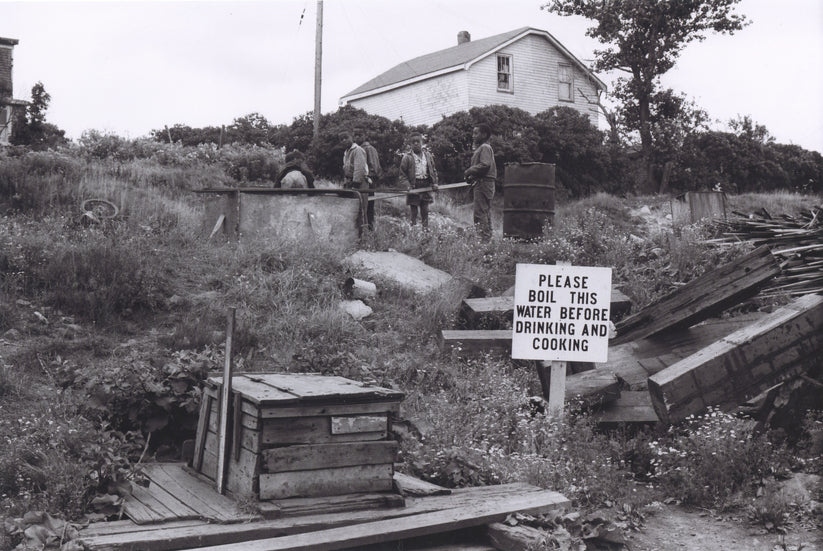Gone But Never Forgotten
Photograph


Image
Video
Audio
 Activities
Activities
LOOK
- Ask students what they see in the photo.
- Ask students to describe what is happening in the photo.
- Ask students what questions they have about the photo.
DO
Africville was a community, a haven, and a home for those who lived there. However, the people of Africville were greatly affected by environmental racism.
Activity: Students should research and understand what environmental racism is and what it looks like.
Students should then explain and discuss the various ways residents of Africville experienced environmental racism.
Details
 Materials
Materials - Photograph
Historical Context
Choose one of the three levels below to match your needs.
- This image displays a sign that warns residents of Africville, on the outskirts of Halifax, to boil water before drinking it.
- Despite paying taxes to the City of Halifax, residents of Africville were denied basic services and encountered many forms of injustice.
- The City of Halifax placed a number of undesirable services in Africville, including a prison and a sewage disposal.
This image of a “boil water” sign highlights one of the many services that residents of Africville, on the outskirts of Halifax, did not have access to, including clean water to drink and cook with.
Despite paying taxes to the City of Halifax, Africvillians were denied basic municipal services such as paved roads, running water, sewers, and garbage collection.
In addition, they experienced environmental racism, as the City of Halifax placed a number of undesirable services in Africville, including a fertilizer plant, a prison, a sewage disposal, and an infectious diseases hospital.
This image displays a sign that warns residents of Africville, on the outskirts of Halifax, Nova Scotia, to boil water before drinking it or using it to cook with. Africvillians encountered many forms of injustice, including environmental racism. The “boil water” sign highlights one of the many services that Africville residents did not have access to, including clean water.
Despite paying taxes to the City of Halifax, residents of Africville were denied basic municipal services such as paved roads, running water, sewers, and garbage collection. In addition, undesirable services were placed in Africville, including a fertilizer plant, a prison, a sewage disposal, and an infectious diseases hospital.
Images like this can help us to visualize and imagine what life must have been like for Africville residents without the basic services they had a right to.
- This image displays a sign that warns residents of Africville, on the outskirts of Halifax, to boil water before drinking it.
- Despite paying taxes to the City of Halifax, residents of Africville were denied basic services and encountered many forms of injustice.
- The City of Halifax placed a number of undesirable services in Africville, including a prison and a sewage disposal.
This image of a “boil water” sign highlights one of the many services that residents of Africville, on the outskirts of Halifax, did not have access to, including clean water to drink and cook with.
Despite paying taxes to the City of Halifax, Africvillians were denied basic municipal services such as paved roads, running water, sewers, and garbage collection.
In addition, they experienced environmental racism, as the City of Halifax placed a number of undesirable services in Africville, including a fertilizer plant, a prison, a sewage disposal, and an infectious diseases hospital.
This image displays a sign that warns residents of Africville, on the outskirts of Halifax, Nova Scotia, to boil water before drinking it or using it to cook with. Africvillians encountered many forms of injustice, including environmental racism. The “boil water” sign highlights one of the many services that Africville residents did not have access to, including clean water.
Despite paying taxes to the City of Halifax, residents of Africville were denied basic municipal services such as paved roads, running water, sewers, and garbage collection. In addition, undesirable services were placed in Africville, including a fertilizer plant, a prison, a sewage disposal, and an infectious diseases hospital.
Images like this can help us to visualize and imagine what life must have been like for Africville residents without the basic services they had a right to.
Summary
- This image displays a sign that warns residents of Africville, on the outskirts of Halifax, to boil water before drinking it.
- Despite paying taxes to the City of Halifax, residents of Africville were denied basic services and encountered many forms of injustice.
- The City of Halifax placed a number of undesirable services in Africville, including a prison and a sewage disposal.
Essential
This image of a “boil water” sign highlights one of the many services that residents of Africville, on the outskirts of Halifax, did not have access to, including clean water to drink and cook with.
Despite paying taxes to the City of Halifax, Africvillians were denied basic municipal services such as paved roads, running water, sewers, and garbage collection.
In addition, they experienced environmental racism, as the City of Halifax placed a number of undesirable services in Africville, including a fertilizer plant, a prison, a sewage disposal, and an infectious diseases hospital.
In-Depth
This image displays a sign that warns residents of Africville, on the outskirts of Halifax, Nova Scotia, to boil water before drinking it or using it to cook with. Africvillians encountered many forms of injustice, including environmental racism. The “boil water” sign highlights one of the many services that Africville residents did not have access to, including clean water.
Despite paying taxes to the City of Halifax, residents of Africville were denied basic municipal services such as paved roads, running water, sewers, and garbage collection. In addition, undesirable services were placed in Africville, including a fertilizer plant, a prison, a sewage disposal, and an infectious diseases hospital.
Images like this can help us to visualize and imagine what life must have been like for Africville residents without the basic services they had a right to.
